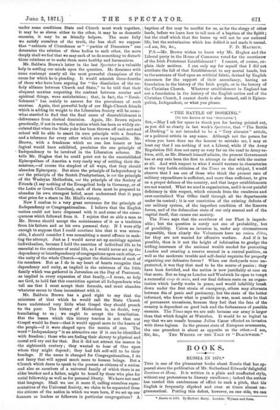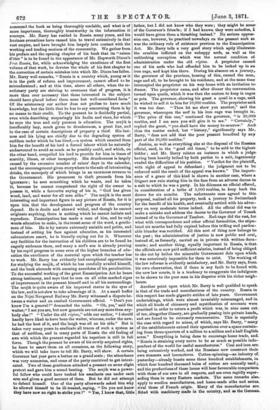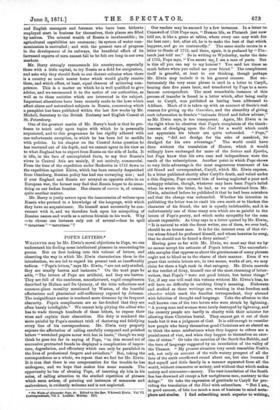BOOKS.
RUSSIA IN 1870.*
Tars is one of the pleasantest books about Russia that has ap- peared since the publication of Mr. Sutherland Edwards' delightful Russians at Home. It is written in a plain and unaffected style, without any pretensions to literary excellence ; indeed the author has carried this carelessness of effect to such a pitch, that his English is frequently slipshod and even at times almost un- grammatical. Patting this defect, however, on one side, we can
• Maria fa 1870. By Herbert Barry. London: Wyman and Sons,
commend the book as being thoroughly readable, and what is of more importance, thoroughly trustworthy in the information it conveys. Mr. Barry has resided in Russia many years, and his business avocations have caused him to travel extensively in that vast empire, and have brought him largely into contact with the working and trading sections of the community. We gather from his preface and the opening chapter of his book that its "raison d'être" is to be found in the appearance of Mr. Hepworth Dixon's Free Russia, for, while acknowledging the excellence of the first volume of that work, he devotes the whole of his first chapter to the correction of certain mistakes into which Mr. Dixon has fallen. Mr. Barry well remarks, "Russia is a country which, young as it is in the path of reform and improvement, cannot afford to be misunderstood ; and at this time, above all others, when the re- actionary party are striving to overcome that of progress, it is more than ever necessary that those interested in the subject should have placed before them none but well-considered facts." Of the aristocracy our author does not profess to have much knowledge, but the little that he has to say concerning them is by no means to their credit. To the peasant he is decidedly partial, even while describing unsparingly his faults and vices, for which he says the true and only panacea is education. The mujik is insufferably lazy, much given to drunkenness, a great liar, and in the case of certain descriptions of property a thief. His lazi- ness and his lying are chiefly due to the degrading system of serfdom under which he has lived,—a system which exacted from him for the benefit of his lord a forced labour which he naturally endeavoured to avoid as much as he possibly could, and which, on the other hand, compelled his lord to provide for him in times of scarcity, illness, or other incapacity. His drunkenness is largely caused by the excessive number of saints' days in the calendar, and the encouragement given everywhere to the sale of intoxicating drinks, the monopoly of which brings in an enormous revenue to the Government. His• proneness to theft proceeds from his ignorance ; he sees something which he wants, and he takes it, because he cannot comprehend the right of the owner to possess it, while a favourite saying of his is, "God has given wood, land, and water for all men alike." The mujik is the most interesting and important figure in any picture of Russia, for it is upon him that the development and progress of the country depend. He is docile and shrewd withal, and though he cannot originate anything, there is nothing which he cannot imitate and reproduce. Emancipation has made a man of him, and he only wants education to make, in the truest sense of the word, a gentle- man of him. He is by nature extremely amiable and polite, and instead of setting his face against education, as his interested calumniators assert, he is literally crying out for it. Wherever any facilities for the instruction of his children are to be found he eagerly embraces them, and many a serf's son is already proving by his rapid progress in some even of the higher branches of edu- cation the excellence of the material upon which the teacher has to work. Mr. Barry has evidently had exceptional opportunities for studying the mujik, of which he has carefully availed himself, and the book abounds with amusing anecdotes of his peculiarities. To the successful working of the great Emancipation Act he bears strong testimony, and says that he sees on all sides marked signs of improvement in the peasant himself and in all his surroundings. The mujik is quite aware of his improved status in the eyes of the law, and is not slow to take advantage of it. At a small buffet on the Nijni Novgorod Railway Mr. Barry witnessed a dispute be- tween a waiter and an exalted Government official. "Don't you know I'm a general?" demanded the noble. "Oh, yes," said the waiter," I see you are, but now generals are not any more than any- body else!" " Under the old regime," adds our author, "I should hardly have liked to have been the waiter, whereas, under the new, he had the best of it, and the laugh was all on his side." But it takes very many years to eradicate all traces of such a system as that of serfdom, and in many parts of Russia the old feeling of awe with which the peasant regarded his superiors is still in full force. Though the peasant be aware of his newly-acquired rights, he fears to assert them on all occasions, as the following story, which we will take leave to tell Mr. Barry, will show. A certain Governor last year gave a battue on a grand scale ; the attendance was very numerous, and some of the party contrived to get intoxi- cated. Two of these gentlemen attacked a peasant on some slight pretext and gave him a sound beating. The mujik was a power- ful fellow who could have tucked his assailants one under each arm and given a good account of them. But he did not attempt to defend himself. One of the party afterwards asked him why he allowed himself to be ill-treated, saying, "Do you not know they have now no right to strike you?" "Yes, I know that, little father, but I did not know who they were ; they might be some' of the Governor's friends ; if I had known they were nobodies, L
would have given them a thrashing instead." No serious oppres- sion can, however, be practised nowadays on the peasant such as was the ordinary rule of existence previous to the Emancipation Act. Mr. Barry tells a very good story which aptly illustrates.
the cruelties inflicted on the unhappy serfs, as well as the unblushing corruption which was the normal condition oh
administration under the old regime. A proprietor caused)
one of his serfs who had offended him to be locked up in an iron cage, and kept him there. During his absence on a journey, the governor of the province, hearing of this, caused the man,
cage and all, to be brought to his residence, and at the same time intercepted the proprietor on his way home with an invitation to,
dinner. The proprietor came, and after dinner the conversation turned upon quails, which it was then the custom to keep in cages as pets. The governor, showing his guest a quail in a cage, said he wished to sell it to him for 10,000 roubles. The proprietor said.
it was too dear. Then let me show you another," said tha governor, whereupon the serf in his iron cage was brought in.
"The price of this one," continued the governor, "is 20,000, roubles, and I am sure you will give it to me." "Certainly,'
replied the guest, "you shall have the money to-morrow." Andk thus the matter ended, but "history," significantly says Mr.. Barry, "does not add that the poor peasant beuefited by any part of the 20,000 roubles."
Justice, as well as everything else at the disposal of the Russian official, used, in the "good old times," to be sold to the highest.
bidder ; and Mr. Barry relates an instance in which a judge, having been heavily bribed by both parties to a suit, ingeniou.sly evaded the difficulties of his position. " Verdict for the plaintiff, with right of appeal to defendant ; the judgment not to be. enforced until the result of the appeal was known." The import- ance of a grace of this kind is shown in another case, where a litigant saw ruin staring him in the face from an adverse decree in a suit to which be was a party. In his dilemma an official offered,.
in consideration of a bribe of 5,000 roubles, to keep back the decree for six months. The unfortunate man agreed to this. proposal, realized all his property, took a journey to Switzerland, for the benefit of his health, and eventually settled with his adver- sary on very moderate terms indeed. All the official did was to. make a mistake and address the decree to the Governor of Tomsk instead of to the Governor of Tambov. Red-tape did the rest, for. what with correspondence and other official formalities, the stipu- lated six months had fully expired before this trifling and pardon- able blunder was rectified. All this sort of thing now belongs tc. the past ; the administration of justice is now public and oral, instead of, as formerly, carried on in private with written docu- ments; and another thing, equally important in Russia, is that the officials are now paid sufficient salaries, instead of being obliged.
to eke out by bribes the miserable Government dole upon which it was notoriously impossible for them to exist. The working of the law reforms is evidently satisfactory, and Mr. Barry says, from.
his own observation, that if there is any fault to be found with. the new law courts, it is a tendency to exaggerate the indulgence. to be shown to the poor man in his disputes with his richer neigh- bours.
Another point upon which Mr. Barry is well qualified to speak. is that of the trade and manufactures of the country. Russia in this respect has made gigantic strides of late years. Government.
undertakings, which were almost invariably mismanaged, and in which all kinds of chicanery and mystification of accounts were practised in order to return a profit which was, in nine cases out.
of ten, altogether illusory, are gradually passing into private hands,. and are found to be extremely remunerative. This is especially the case with regard to mines, of which, says Mr. Barry, "many of the establishments extend their operations over a space contain- ing from three-quarters of a million to a million and a half English, acres." Everything is being done to encourage home trade, an& "Russia is straining every nerve to be as much as possible inde- pendent of the world for useful manufactures." Coal and iron are-.
being extensively worked, and the Rusaians now construct their.
own steamers and locomotives. Cotton-spinning—an industry ot yesterday—already boasts some three hundred establishments, in.
which four hundred thousand bales of cotton are annually used ;. and the productions of these looms will bear favourable comparison. with those of our own in all respects, and are even rapidly super- seding them in many Eastern markets. The same remarks also. apply to woollen manufactures, and home-made silks and satins,. rival those of French origin. Many of the manufactories are fitted with machinery made in the country, and as the German.
and English managers and foremen who have been hitherto employed start in business for themselves, their places are filled by natives. The mineral wealth of Russia is inexhaustible; its agricultural capabilities are enormous ; its system of water com- munication is unrivalled ; and with the present rate of progress in the development of its railways, the beneficial effect of its increased exports of corn cannot fail to be felt ere long in our own markets.
Mr. Barry strongly recommends his countrymen, especially those with a little capital, to try Russia as a field for emigration, and asks why they should flock to our distant colonies when there is a country so much nearer home which would gladly receive them, and which offers, at least, equal chances of achieving com- petence. This is a matter on which he is well qualified to give advice, and we recommend it to the notice of our authorities, as well as to those societies which are interested in the subject. Important alterations have been recently made in the laws which affect aliens and naturalized subjects in Russia, concerning which a pamphlet has been published within the last few weeks by Mr. Michell, Secretary to the British Embassy and English Consul at St. Petersburg.
One of the greatest merits of Mr. Barry's book is that he pro- fesses to touch only upon topics with which he is personally acquainted, and to this programme he has rigidly adhered with one unfortunate exception, in which he has been led to meddle with politics. In his chapter on the Central Asian question he has ventured out of his depth, and we cannot agree in his view as to what England has to expect from Russia on the side of India. It is idle, in the face of accomplished facts, to say that Russia's views in Central Asia are mainly, if not entirely, commercial. From the time of the expedition under Beckovitz in 1713 down to the expedition against Khiva, which has been recently despatched from Orenburg, Russian policy has had one unvarying aim ; and if ever England and Russia are arrayed on opposite sides in an European war, the former may find that Russia hopes to do some- thing on our Indian frontier. Her chance of success is, of course, quite another matter.
Mr. Barry is justly severe upon the inaccuracies of writers upon Russia who pretend to a knowledge of the language, with which they have no acquaintance. He himself must necessarily be con- versant with it, and we therefore look upon his misspelling of Russian names and words as a serious blemish in his work. Why —to choose one instance only out of several—does he spell " tarantass " " tarentasse "?




































 Previous page
Previous page